SPK, "Auto Da Fe"
 As a compilation, this is a somewhat odd proposition: the first half consists of singles dating back to before the release of Information Overload Unit, the latter is post-Leichenschrei, but pre-Machine Age Voodoo material, so essentially sandwiched between their zenith and their nadir. With early material vacillating between noisy textures and punk trappings, and the later tracks showing hints of their synth-pop direction, there's a definite dichotomy here, but both halves excel greatly in what they seek to do.
As a compilation, this is a somewhat odd proposition: the first half consists of singles dating back to before the release of Information Overload Unit, the latter is post-Leichenschrei, but pre-Machine Age Voodoo material, so essentially sandwiched between their zenith and their nadir. With early material vacillating between noisy textures and punk trappings, and the later tracks showing hints of their synth-pop direction, there's a definite dichotomy here, but both halves excel greatly in what they seek to do.
Walter Ulbricht/Mute
Opening with material from their confusingly early singles, "Factory," "Mekano," and "Meat Processing Section" (all of which shared tracks between them), "Contact" and "Mekano" both use abstractly processed and effected guitars with what sounds like metal barrel percussion and rather naked vocals to create something that’s closer to "punk" than "industrial," to attach genre terms, but fits into neither pigeonhole well."Germanik" amps up the dissonance, with the guitar sounding as if it is piped in from another room while metal percussion and barked pseudo-fascist German vocals become the norm.
Once we get to the middle portion of the album the dissonance is ramped up.The previous three tracks come across as downright quaint once "Retard" starts.Different from the Information Overload Unit track of the same title, the combination of extreme high and low frequencies rival TG's "Subhuman" for pure obnoxiousness, and the lyrics discussing the autopsy of a 12 year old girl is anything but pleasant.I honestly have problems sitting through the entire song just due to the high pitched whistling noise that never relents.
But, of course, there is "Slogun."I think an entire book could be written on both the track and its legacy in various forms of aggressive music.An unidentifiable morass of electronics, guitar, distortion, and what sounds like power tools blast for over six minutes, underscored by an overdriven, rudimentary drum machine beat.Probably most well known is the vocals:manic shouts from both Neil Hill and Graeme Revell barking the slogan of the original Socialist Patients Collective, "Kill for inner peace/bomb for mental health/therapy through violence." Words can't do "Slogun" justice:it is a visceral, physical experience that never stops.I’ve never heard any other piece of music from any genre that hits on such a somatic level.I cannot disagree with the masses that sing the praises of this song:most of SPK's career was great, but this is the perfect culmination of their work, and perhaps the definitive song of the era.
There wasn't an attempt to do a "Slogun 2" after this, on either Information Overload Unit or Leichenschrei, nor should there have been.The remainder of Auto Da Fe is a selection of studio and single tracks from 1982 and 1983, taking the song-oriented direction that was hinted at on Leichenschrei (i.e., "Despair," "Day of Pigs"), but strip away much of the noise and distortion, revealing a sparse, dour proto-pop that is quite different from what they did before, but not entirely out of character either.
"Metal Field" keeps many of the pieces from Leichenschrei:synthetic and metal drums, analog synths, and vocals, but it’s more restrained and subtle.Revell is actually singing, though in a flat, emotionless monotone, and the synths are sequenced into actual melodies and bass lines.It is ostensibly danceable electro, but has this cold, detached feel that makes it anything but conventional.
Similarly, the more upbeat "Walking on Dead Steps" puts together many of the same pieces, but even with its faster tempo and higher energy, lyrics like "fascism is in fashion again" show it wasn't an attempt to gain commercial success.The material from the Dekompositions EP that rounds out the album is comparatively more atmospheric, channeling the mood of their darker work, but with notably more polish and poise."Culturecide" and "Another Dark Age" sound less aggressive compared to other tracks, but are far from danceable, instead beautifully capturing a depressive, bleak mood throughout, even without the layers of grimy distortion and feedback.
It should also be noted that this is not a complete collection of early SPK, and a fair number of things were left off.Somewhat understandably, "Factory" was left off, as it's just a different take of "Mekano" with alternate lyrics, though I would have liked it to have it included for completeness sake."No More" also comes from these early sessions, but is at its core rather amateurish, high schooler punk rock.It's not bad per se, but it doesn’t fit in with any of the other SPK material either.
The "See Saw/Chambermusik" 7" is also excluded completely, likely due to the fact that Revell was not part of the sessions:he was away in the UK recording Information Overload Unit, while Neil Hill, and Hill's wife recorded these tracks in Australia.They actually aren't far removed from what Revell and company were doing at the same time, so their exclusion seems to be more about Revell not participating in the sessions, or perhaps licensing/legal issues.
I think we all know the story after this point:Revell and Leong recorded their attempt at pop music, Machine Age Voodoo, which always struck me as trying too hard.The stiff attempts at funk and conventional pop vocals made the last remnants of the "old" SPK that were there: the metal percussion, feel like an attention-seeking novelty rather than an asset.Coupled with the stereotypical, almost offensive Asian influenced sound, it was an unpleasant piece of generic pop.I'll shamelessly admit that I have the entire Pet Shop Boys discography and actually like Ministry's With Sympathy, but Machine Age Voodoo was simply too much.
Afterward, Revell went on to record Zamia Lehmanni as SPK, paving the way for his current career in film score.That album I can certainly appreciate, but barring "In Flagrante Delicto," it never grabbed me like their early stuff.The slight reprise of pop that came with Gold and Poison I actually found pleasant, if innocuous and vanilla.
But obviously, their catalog up to Dekompositions is what represents their strongest contributions to adventurous music, and it all has held up well over the years.While Leichenschrei is their most cohesive, singular work, I probably show Auto Da Fe some favoritism because it has such a varying sound to it.It actually excels in its disjointedness, and the fact that it has "Slogun" on it doesn’t hurt either.I don't think that any these three albums can be separated though, as they all have their own strengths and contributions to experimental sound art.While I personally only been exposed to them for a bit over a decade, they have lost none of their impact on me, and continue to be as brilliant as ever.
samples:
 



